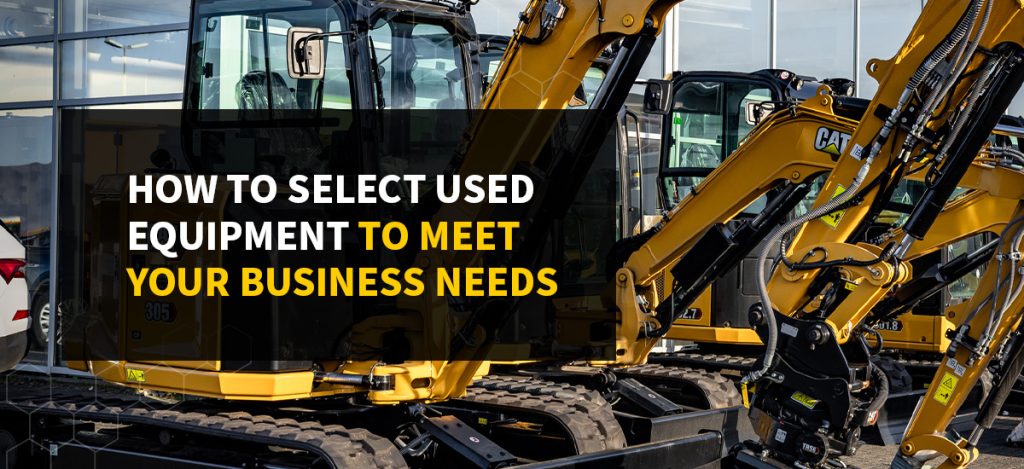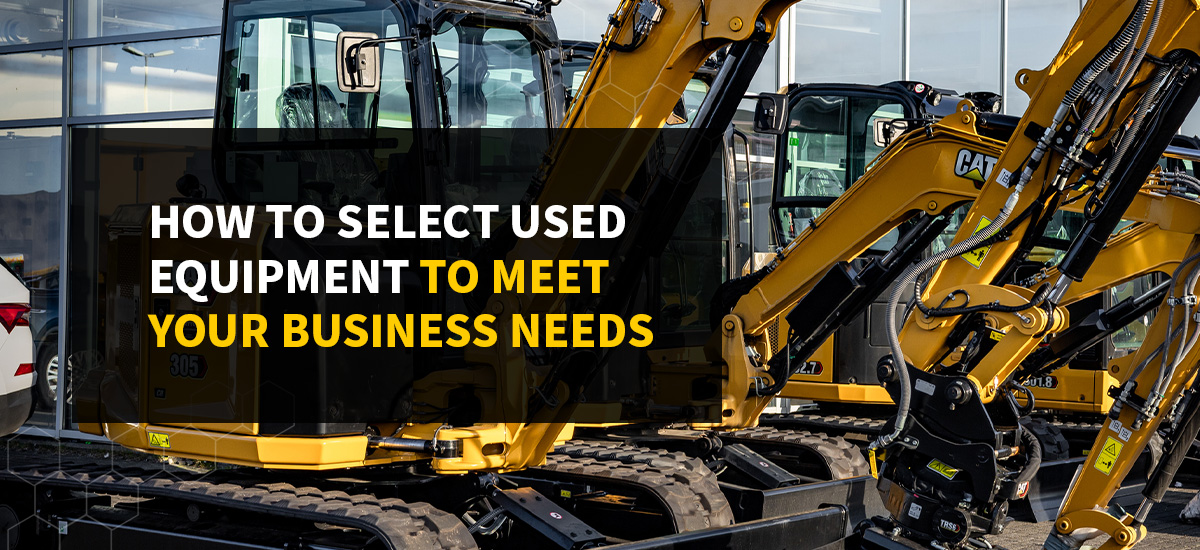
When your business needs to expand operations or replace aging machinery, selecting the right equipment is crucial. While buying new might seem like the most straightforward route, used equipment can provide a more affordable, practical alternative that still meets your needs.
With the right approach, you can make a choice that sets your business up for success without overstretching your budget. This guide shows you how to choose used equipment, helping you identify the right fit for your applications, environment and long-term goals.
Factors to Consider When Choosing Used Machinery for Specific Tasks
Acquiring used equipment is an effective strategy for businesses to enhance productivity while managing expenses effectively. Here are some important factors to consider when evaluating and selecting preowned equipment for projects.
Cost
One of the primary reasons businesses opt for used equipment is cost savings. Choosing used machinery can significantly reduce the initial purchase price compared to buying new. Lower prices allow companies to allocate capital to other areas of their operations, such as hiring or expanding their service offerings.
Age and Condition
Consider the age of the equipment and its overall condition when choosing used machinery for specific tasks. Older machines may come at a more attractive price but could require more frequent repairs or replacements than newer models. However, in some cases, well-maintained machines with moderate hours may outperform newer models that were pushed too hard.
Request detailed documentation from the seller, including previous refurbishments, repairs and upgrades. Assessing these factors ensures you get the best performance and longevity from your investment.
Maintenance History
The maintenance history of used equipment is imperative. These records reveal how seriously the previous owner took care of their fleet. Ask for a full service log, which should include information on any parts replaced, any significant repairs, the regularity of its maintenance and information about the technicians who did the repairs.
Machines with clear and consistent maintenance records, ideally serviced by authorized dealers or certified technicians, are generally more reliable and require fewer repairs in the long term.
Seller’s Reputation
Assessing the seller’s credibility is vital for picking the right used equipment for jobs. Choose dealers with strong industry reputations, positive customer testimonials and transparent business practices. Reliable sellers provide accurate information, supporting documentation, clear transaction processes, support options after the sale and allow inspections, minimizing risks associated with purchasing used equipment.
Spare Parts Availability
Confirm the availability of replacement parts before finalizing your purchase. Choosing machinery from established brands like Caterpillar ensures easy access to spare parts and widespread service networks through official dealers. This reduces potential downtime due to part shortages and simplifies ongoing maintenance.
Legal and Regulatory Compliance
Before purchasing preowned equipment, confirm it complies with current legal and regulatory requirements. These include safety standards, emissions regulations and any necessary certifications. Non-compliant equipment can lead to fines and prohibition from operating in certain jurisdictions.
Technical Specifications and Compatibility
Ensure the used machinery you consider is compatible with your existing equipment and systems. Evaluate the machine’s technical specifications, such as weight, power, fuel consumption and capacity to establish compatibility and ease of integration. Checking if it can accommodate the specific attachments you need for your tasks is also important.
Benefits of Used Equipment

Choosing used equipment for specific tasks yields significant advantages to your business operations:
- Affordability: Purchasing used machinery significantly reduces upfront costs compared to buying new. This affordability allows you to reallocate saved capital to other business areas.
- Lower depreciation rates: In most cases, used machinery has already undergone this initial depreciation phase, meaning its value will decrease slowly, providing better long-term financial value for your business.
- Improved business capacity: Affordable used equipment enables your business to quickly scale operations without the financial strain of purchasing new machinery.
- Ideal for short-term applications: Used machinery provides a cost-effective alternative for temporary or seasonal projects.
- Sustainability: Opting for used equipment promotes environmental sustainability by reducing demand for new manufacturing and extending the lifespan of existing machinery.
3 Tips for Selecting the Best Preowned Equipment for Projects
Follow these practical strategies when evaluating used machinery for your business needs:
- Test the equipment: Always inspect machinery in person and, if possible, test its operation. Run the equipment through its paces in conditions similar to what it will face in your operations. Thorough testing will give you a better understanding of its performance before purchase.
- Ask for financing options: While used machinery is generally more affordable, you might still need financial assistance. Ask the seller if they offer financing options or if they can direct you to a financial institution that works with equipment purchases. Flexible financing plans can help you spread costs, especially on a tight budget.
- Understand warranty and return policies: It’s important to understand the warranty and return policies offered by the seller. A warranty can provide additional peace of mind if issues arise after purchase, while a clear return policy ensures that you can easily resolve any post-purchase problems.
Questions to Ask When Choosing Used Equipment
Before committing to any piece of used equipment, think through your operational goals, timeline and budget. Asking yourself these questions will help you clarify needs and avoid costly surprises:
Why Do You Need to Purchase Equipment?
Clarify your reasons for needing used machinery. Is it to replace outdated equipment, expand capacity or support sudden spikes in demand? The reason behind your investment will shape what kind of machine you need and how much you’re willing to spend.
What’s the Intended Use of the Equipment?
Will the machine run daily or only when a specific task arises? Is it for heavy-duty excavation or lighter material handling? Understanding the workload will help you choose used machinery that aligns with realities in the field.
How Long Do You Need the Equipment?
If the equipment is for short-term use, affordability and availability matter most. For long-term integration into your fleet, focus more on lifespan, service history and compatibility with other machines.
What Else Do You Need to Get the Job Done?
Evaluate whether additional attachments, accessories or operator certifications are necessary to complete your tasks. A trusted dealer should be able to help you find the right equipment and tools to get the job done.
Browse Used Equipment From Thompson Machinery
Choosing used machinery strategically positions your business to achieve greater productivity, operational efficiency and cost savings. By carefully evaluating your equipment needs and thoroughly inspecting your options, you can set a strong foundation for sustainable growth and profitability.
Thompson Machinery is your trusted partner in acquiring high-quality used equipment. As an authorized Cat® dealer, we maintain an extensive selection of reliable preowned equipment for various applications. Our expert team will guide you through every step to find the perfect solution tailored to your project requirements and budget.
Explore our current used equipment inventory today or contact us to request a quote.




